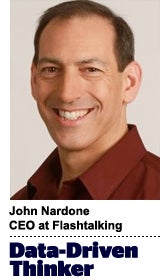 “Data-Driven Thinking” is written by members of the media community and contains fresh ideas on the digital revolution in media.
“Data-Driven Thinking” is written by members of the media community and contains fresh ideas on the digital revolution in media.
Today’s column is written by John Nardone, CEO at Flashtalking.
The cracks are beginning to show on the duopoly’s stronghold. With the finalization of AT&T’s acquisition of AppNexus, we can envision a world in which Google and Facebook have to compete for digital media dollars rather than lean back and enjoy their status as media plan requirements.
Within the next five years, I believe our industry is going to shift from a world in which nearly all spend and power is consolidated with two players to one with multiple centers of gravity –perhaps as many as half a dozen.
This shift in competitive balance will drastically change the reality in which the walled gardens operate – and potentially affect their ability to keep their walls up at all. It will also have significant implications for many smaller ad tech firms and their roles within the industry.
Multiple centers of gravity
AT&T, with its recent acquisitions of Time Warner and AppNexus, has made its intent clear: It plans to become the go-to marketplace for advertisers looking to buy premium video and advanced television ads using its data. And now it has the content and the ad tech to make that vision a reality.
But AT&T isn’t the only player that’s bulking up. The growth in Amazon’s ad business, for example, has been stunning. The company more than doubled its ad revenue in the first quarter of 2018, generating more than $2 billion. Not only is its ad revenue growing, but its pace of growth is also accelerating.
Meanwhile, the wise industry watcher should also keep an eye on Verizon. With its Oath subsidiary, the company is really only a couple of moves away from stepping up next to AT&T in its all-in bid for the ad revenue that today flows to linear TV and/or Google and Facebook.
The inevitability of real competition being introduced to the ecosystem means at least one, if not all, of the new superpowers will use openness and data portability as a competitive wedge. As a result, the others will be forced to respond. This is how the walls will start to come down.
We’re already seeing AT&T put transparency at the heart of its messaging. When The Wall Street Journal asked Brian Lesser, AT&T’s advertising and analytics chief and a former AppNexus board member, whether the company intends to build another walled garden, he said AT&T wanted to give advertisers access to data on real performance, not performance proxies.
The move toward openness and data portability is inevitable. Advertisers today have begrudgingly tolerated the data silos of Google and Facebook. But abiding five or more silos? It’s simply untenable.
With the rise of AT&T, Amazon, Verizon and others, major advertisers will finally have something they haven’t before: the option to walk away from Facebook and Google.
If they don’t like the data transparency they’re getting from one or both, they will have a viable place to take their dollars instead. What remains to be seen is how many major advertisers have to walk away before Google and Facebook decide to open up their ecosystems to meet brand demands.
Everything in between
Of course, as Google and Facebook have already done, the new superpowers will no doubt offer their own analytics views of the effectiveness of ad dollars spent on their vast platforms. But we all know how it feels when the market is controlled by two players that get to grade their own homework. So, with the addition of two, maybe three, new supermajors, the need for objective third parties will be greater than ever. Advertisers have strained to operate within the two standards set by the duopoly, but operating within five or six simultaneously is a nonstarter.
The breakdown of the duopoly will open many doors, and not just for Google’s and Facebook’s new competitors. For the first time ever, advertisers are going to have real leverage – and choice – when it comes to negotiating with the industry’s biggest players. And the ad tech industry’s smaller players will have the opportunity to fill new needs within the more diversified landscape.
As more formidable challengers arise around the duopoly and data openness becomes a competitive currency for advertisers, the need for agnostic players in between the titans will emerge as a clear imperative for a functioning market, let alone a thriving one. Exactly what powers and functions live in the middle layer of ad tech remains to seen.
That, I would suggest, is the main question facing the ad tech players that don’t get subsumed into one of the larger offerings.
Follow Flashtalking (@flashtalking) and AdExchanger (@adexchanger) on Twitter.











